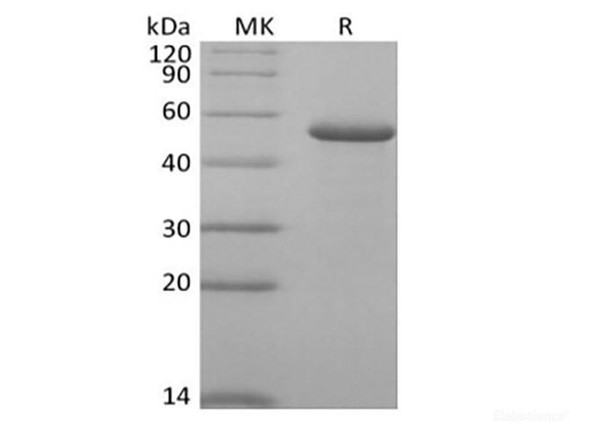Recombinant Human CD99/MIC2 (C-6His) (RPES6228)
- SKU:
- RPES6228
- Product Type:
- Recombinant Protein
- Species:
- Human
Description
| Product Name: | Recombinant Human CD99/MIC2 (C-6His) |
| Product Code: | RPES6228 |
| Size: | 10µg |
| Species: | Human |
| Expression Host: | HEK293 Cells |
| Synonyms: | CD99 Antigen, 12E7, E2 Antigen, Protein MIC2, T-Cell Surface Glycoprotein E2, CD99, MIC2, MIC2X, MIC2Y |
| Mol Mass: | 11.13 kDa |
| AP Mol Mass: | 18 kDa |
| Tag: | C-6His |
| Purity: | > 90 % as determined by reducing SDS-PAGE. |
| Endotoxin Level: | < 1.0 EU per μg of the protein as determined by the LAL method. |
| Bio Activity: | Testing in progress |
| Sequence: | Asp23-Asp122 |
| Accession: | P14209 |
| Storage: | Generally, lyophilized proteins are stable for up to 12 months when stored at -20 to -80°C. Reconstituted protein solution can be stored at 4-8°C for 2-7 days. Aliquots of reconstituted samples are stable at < -20°C for 3 months. |
| Shipping: | This product is provided as lyophilized powder which is shipped with ice packs. |
| Formulation: | Lyophilized from a 0.2 μm filtered solution of 20mM PB, 150mM NaCl, pH 7.4. Normally 5 % - 8 % trehalose, mannitol and 0.01% Tween80 are added as protectants before lyophilization. Please refer to the specific buffer information in the printed man |
| Reconstitution: | Please refer to the printed manual for detailed information. |
| Background: | CD99 is a type I transmembrane glycoprotein and the founding member of the CD99 family of molecules. The extracellular domain of CD99 contains no identifiable motifs, its cytoplasmic region, although short, does have signal transduction capability. Cells known to express CD99 include fibroblasts, neutrophils, T cells, double positive thymocytes, CD34+ stem cells, monocytes and endothelial cells. Two types of CD99 isoforms have been classified. Native human CD99 is referred to as the long, or type I isoform. The best studied type II isoform shows an Asp-Gly substitution for the C terminal 27 amino acids. The type I and II isoforms have distinctive signal transduction pathways (FAKsrc for type I PI3K plus srcERK1/2 for type II), and mediate clearly different biological outcomes. Homophilic interaction between CD99 on the neutrophil and CD99 on the endothelial cell regulates the transendothelial migration of neutrophils during inflammation. Human CD99 has 48% aa sequence identity to mouse CD99. |






